Blog
The loss of a good Morrab Friend – Dr Stephen Clark

It is with the saddest of hearts that we need to share the news that our much-loved life member, volunteer and former Trustee, Stephen Clark, passed away on the 2nd of March.
It is no exaggeration to say that Steve loved the Morrab Library. Having joined in 2018, he threw himself in at the deep end, volunteering for reception desk duty not once, but twice a week, where he welcomed visitors, suggested all sorts of interesting book titles to borrowers, and practised his language skills with particular members too.
Steve soon became a member of the library’s Book Selection Committee where he made brilliant suggestions to enhance the library’s collections, particularly in the areas of science and poetry. He stuck to his guns when the rest of the Committee occasionally questioned any of his choices, delivering eloquent and passionate arguments in their favour, and more times than not, winning.
When the library started a new Poetry Group, a fortnightly opportunity for members to discuss a different poet, Steve was an active participant. Much to the joy of his colleagues at these meetings, Steve arrived with a freshly baked cake, it’s flavour based on the nationality of the poet who was being discussed that week. Steve’s cakes also made regular appearances at library events – our fairs and fetes, Christmas parties and more. While all of these cakes were delicious, his Simnel cake was out of this world!

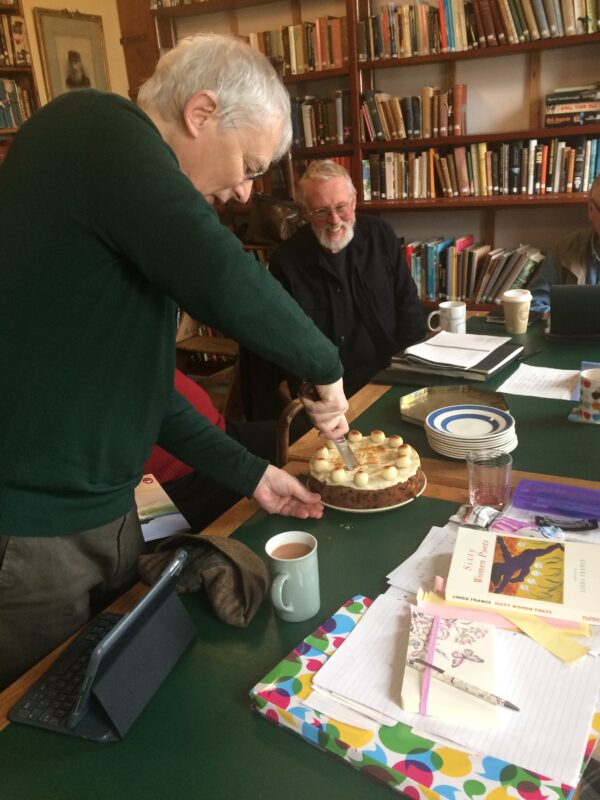
Many who attended the Library’s Christmas Party in 2019 will remember Steve’s acting skills too, when he played the role of former Library President, J A Hamilton, in the performance of Camidge & Stringer’s ‘Remembering the Morrab Library in 1919’.
Importantly, Steve’s love for the library ultimately manifested itself when he joined the Management Committee. In his own words:
“When you are in love, you want to do things for the object of your desire. So when, five months after joining the library, I was asked to join that mysterious body, the Management Trustee Committee, as Honorary Secretary I accepted. It has to be said that I agreed with some trepidation at first; I was still very starry-eyed about the Morrab and really had no idea of the responsibilities of the secretary, still less what the Management Trustees actually did. Being a Trustee is a privilege and a responsibility. It is like being behind the scenes with the production team in a theatre. We are there to keep the building in good shape, from the state of the roof to making sure that the plugs and fire alarms are tested, and the Wi-Fi system works. We appoint the staff and work with them to fulfil the current needs and future plans of the library. Overall, it’s been a fascinating and an immensely rewarding experience to feel that I have contributed something to not only keeping the Morrab going but also to shaping its future. I’m still in love.”
Finally, we’d like to share Steve’s reflections on his favourite room in the library – the Hedgeland. Perhaps those who knew Steve may like to pause and reflect when visiting here, and remember him fondly:
“I have a particular affection for the Hedgeland room. I feel it doesn’t have to stand up to the claims that the neighbouring literature room has for the best view and the most comfortable chair. It’s as if the attention is more inward looking to the room’s true purpose – the books and not the distracting view. And what books! The range of subjects in this room is astonishing: from espionage, sociology, through fairy tales to naval history, games, theatre, music. The list could go on for ever. If your work doesn’t hold your attention or you need some distraction, just browse the wondrous shelves. I love the shape of the room too, unlike the literature room you are not there immediately; you pass through the door but there is a short passage giving a sense of mystery and then a surprise as the whole room is laid out before you. “
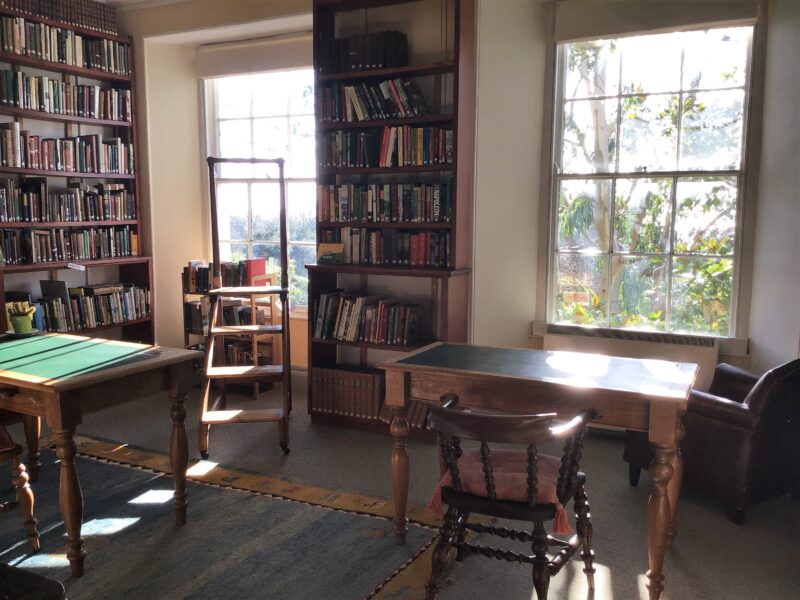
Steve was a generous and warm friend to so many of us at Morrab Library. His passion and enthusiasm was always evident, and he shared this with all he came into contact with. He had a gentle and ironic sense of humour. He was a true renaissance man – sharing with us his scientific knowledge, and his poetry writing, as well as his profound knowledge and love of literature. And cricket too.
Steve will be sorely missed by so many of us, but we know that a part of Steve’s heart will always remain here in Morrab Library, and his legacy will endure.
Long-Vanished People: J.T. Blight Re-imagined in the Context of 19th Century Psychology
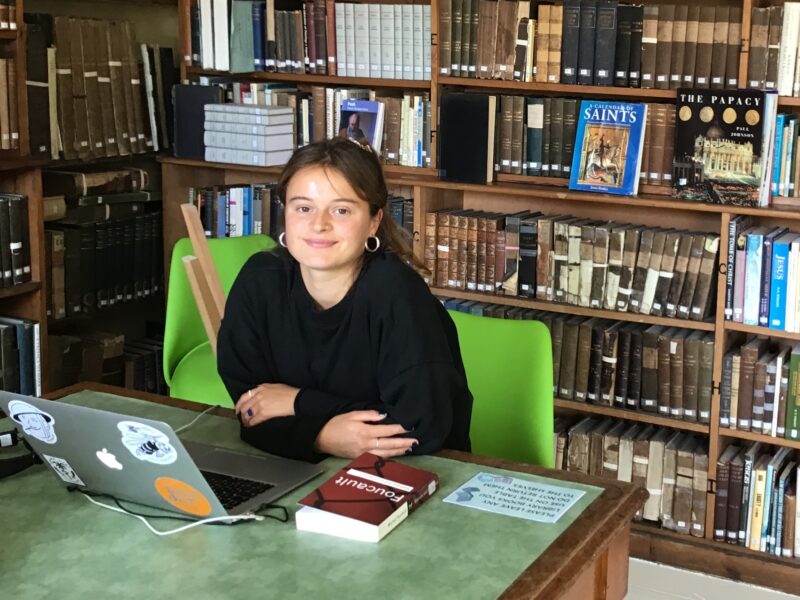
In the summer of 2021, Morrab Library hosted Eliza McCarthy, an intern from the Penryn campus of Exeter University who funded Eliza’s project through their Access to Internships programme. Eliza is an English Literature student and spent her time exploring the library’s archive relating to John Thomas Blight (1835-1911), Cornish archaeologist and artist. Blight found himself incarcerated in the Bodmin Mental Asylum, and Eliza’s paper explores Blight’s life and the wider issues around the care of people with mental health problems at that time.
It was a delight to host Eliza, and the results of her hard work are evident in the paper she wrote, which is reproduced here, and will be added to the JT Blight Archive collection for future researchers.
Click here to read Eliza’s Blog
A remarkable discovery in our Archive collection
In the midst of lockdown over 2020 and 2021, Morrab Library was contacted by Alison Shell, Professor of Early Modern Studies at University College London. She had come across a brief citation to an item in our Archive collection, created by the late John Simmonds, who, over twenty years, had created a record on paper of all our holdings – an extraordinary piece of work when you consider we hold more than 5,000 records.
Alison’s curiosity was piqued by this record – all John, and his colleague the notable author and historian P.A.S Pool, had been able to unearth about this unassuming slim volume:
MOR/MAN/5 – ” a volume written in Latin of the texts of several religious plays in the 17th or early 18th century hand. The subjects include King Canute, Earl Godwin and the prophet Mahomet (portrayed as the Antichrist). A gift of the Reverend James Halliwell (1862). Brown leather, bound, 16cm”
She made the long journey from London to visit the library and examine the volume, and her efforts were rewarded with a truly remarkable discovery. Read Alison’s blog to find out more…
A volume of 17th-century Latin plays written by English Catholics, almost certainly at the English College at St Omer, has recently been discovered in the Morrab Library collections (1).
During the reign of Elizabeth I, when it became clear that England would remain Protestant for the foreseeable future, expatriate English Catholics grew increasingly concerned to preserve their faith for successive generations. To this end, they set up educational institutions in continental Europe, of which the English College at St Omer, or ‘St Omers’ – the forerunner of Stonyhurst College in Lancashire — is one of the best-known. Catering mostly for school-age boys, it was run by the Jesuit order, well-known across Europe for its educational efforts. Jesuits knew how effectively drama could develop oral fluency, confidence and memory skills in their charges, and — anticipating present-day educators — made considerable use of it as a teaching aid. Their productions also functioned as a public relations exercise when mounted for distinguished visitors or the local community, often deploying music, dance and spectacle to show off the students’ abilities. Most of all, they promoted the ideals of Counter-Reformation Catholicism in an attractive and imaginatively compelling manner – not least among the young actors themselves. (2)
An important part of the Order’s missionary endeavour, Jesuit drama had an international reach through Catholic Europe and even beyond. Yet it was very much coloured by national concerns, as the present volume demonstrates. Even though its English writers and actors were living and working outside England, they were passionately committed to bringing their mother country back within the Catholic fold. Two plays in the present compilation draw on English history: the tragedy Canutus magno maior (Canute, greater than the great) dramatizes the life of King Canute, the other, Godwinus, is shaped round historical anecdotes about Godwin, Earl of Wessex. The volume also features another tragedy, Clearchus furens (Clearchus raging); an apocalyptic play in which Christ clashes with Mohammed; an untitled dialogue with characters including an angel and a poet; and the allegorical drama Philander, sive Angelus custos (Philander, or The Guardian Angel) (Fig.1). The latter play is signed by Francis Biddulph, a student at St Omers between 1664 and 1670. (3) (Fig.2). Since English Jesuit plays rarely travelled between colleges and had relatively little currency outside them, this makes it overwhelmingly likely that the manuscript was a St Omers production. The inclusion of Biddulph’s work also suggests that the volume was compiled in the mid- to late 1660s, though Philander might still have been read after Biddulph had left St Omers.
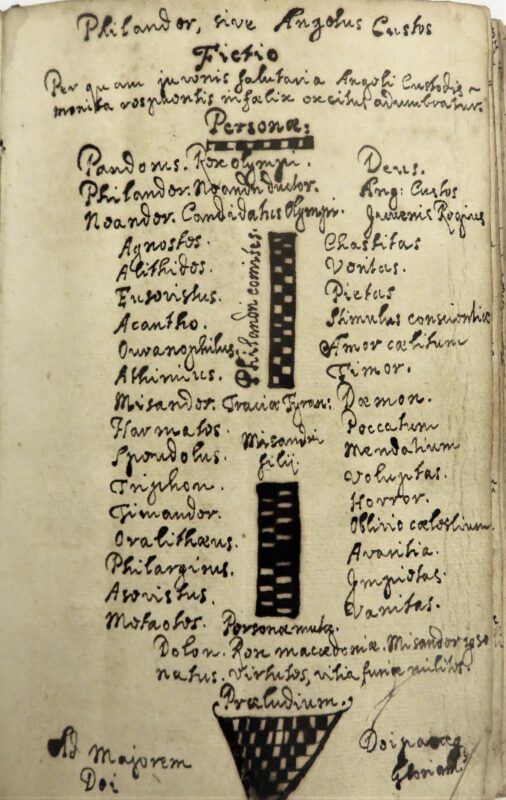 Figure 1
Figure 1

Figure 2
The volume was most probably compiled for reading rather than performance, though it is likely that the plays themselves were put on in some form. The play about Christ and Mohammed may be the apocalyptic drama of which the St Omers register records a performance in 1669, another reason to attribute it to the College (4). No evidence has yet been found of the other plays’ production, but this is not surprising; the dramatic culture of St Omers encompassed everything from classroom performance upwards, and much of it was ephemeral. The more prestigious a production, the more likely it was to be recorded, but even for plays of this kind, records are incomplete and unsystematic. It is unusual, though, for more than one copy of a St Omers play to survive, and the fact that a British Library manuscript also contains copies of Canutus and Clearchus suggests that these particular dramas were relatively high-profile and well regarded (5).
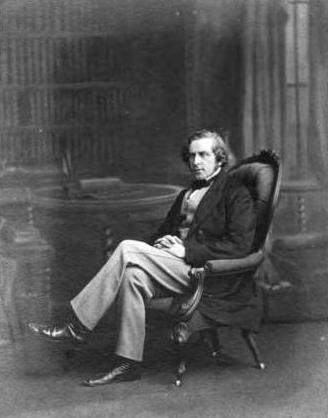
The manuscript came into the Morrab Library as part of a donation of seventeenth- and eighteenth-century playtexts from the Shakespeare scholar James Orchard Halliwell (later Halliwell-Phillipps) (Fig.3, above). One item in his correspondence with the library contains an undated list of books and manuscripts that mentions Canutus and Clearchus (6). Halliwell-Phillipps was a generous donor to repositories, including the Shakespeare Birthplace Trust in Stratford-upon-Avon, Chetham’s Library in Manchester and the Smithsonian Institution in Washington; he had a particular love of Penzance, where he frequently holidayed. He was awarded the freedom of the borough for his patronage, and a bookcase in the Morrab Library bears his name to this day (7) (Fig.4). Seven decades after his death, in 1964, the Library put the bulk of his collection up for sale at a time of financial difficulty, and the collection was dispersed: mostly to Edinburgh University Library, another institution that had benefited from Halliwell-Phillipps’s patronage (8). The St Omers plays were not included, most likely because they were not considered worth selling. Perhaps they were thought to be extraneous to English dramatic history, or peripheral within Halliwell-Phillipps’s collection — or perhaps the Latin was off-putting. But the oversight has had the happy result of preserving this rare and compelling find within the Morrab’s own collections.
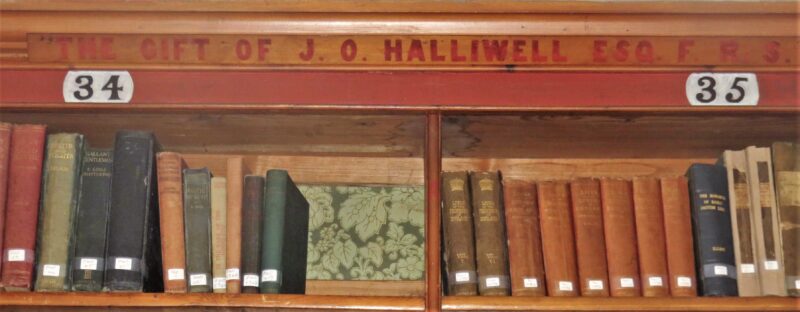
Figure 4
(With thanks to Lisa Di Tommaso; Arnold Hunt; Joe Reed, Archivist at Stonyhurst College; and the Leverhulme Trust for funding my archival research through a Major Research Fellowship.)
Alison Shell (Professor)
Department of English
University College London
FOOTNOTES
1: Morrab Library, MOR/MAN/5.
2: William H. McCabe, SJ., An Introduction to the Jesuit Theater. Ed. Louis J. Oldani, SJ. (St Louis: Institute of Jesuit Sources, 1983), and Paul Shore, ‘Counter-Reformation Drama’, ch.19 in The Ashgate Research Companion to the Counter-Reformation, ed. Alexandra Bamji, Geert H. Janssen and Mary Laven (Farnham: Ashgate, 2013).
3: Geoffrey Holt, SJ. St Omers and Bruges Colleges, 1593-1773: A Biographical Dictionary (S.l. Catholic Record Society, 1979), p.36. For biographical details of another, earlier Francis Biddulph, see Thomas M. McCoog, S.J., English and Welsh Jesuits, 1555-1650: Part 1, A-F, Catholic Record Society, vol.74 (London: Catholic Record Society, 1994), p.170.
4: McCabe, p.99.
5: BL Add MS 41182.
6: Morrab Library, Halliwell-Phillipps correspondence (MOR/LIB/20a).
7: Arthur Freeman and Janet Ing Freeman, ‘Phillipps, James Orchard Halliwell- (1820–1889), Oxford Dictionary of National Biography, online; The Cornishman, 19 October 1893, p.6.
8: Cyril Noall, The Penzance Library, 1818-1968 (Penzance: Penzance Library, 1968), pp.28-9; ‘In the Saleroom’, Times Literary Supplement, 30 July 1964.
